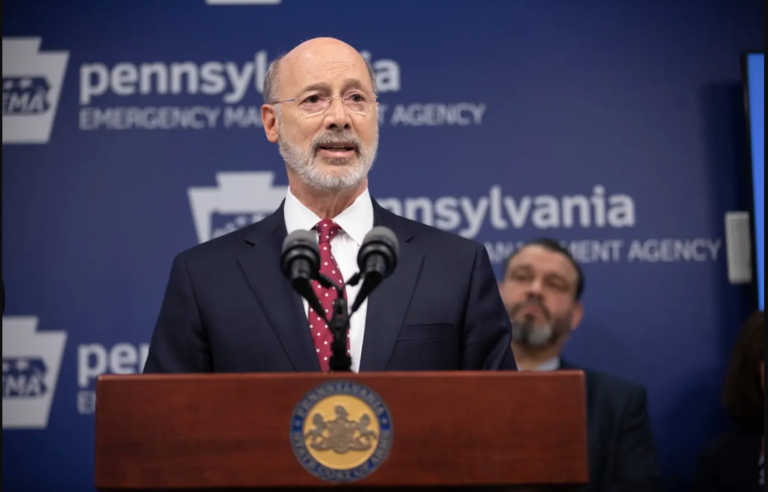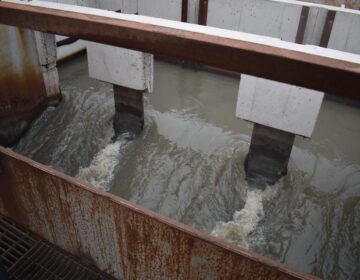Pa. withholds records on pandemic plans, equipment and business waivers
Government accountability advocates say Wolf’s administration has fallen short during the COVID-19 crisis, withholding critical public documents.

Gov. Tom Wolf. (Spotlight PA)
Pennsylvania Gov. Tom Wolf campaigned on transparency, going so far as allowing reporters to view his personal income tax returns while on the trail.
But government accountability advocates say Wolf’s administration has fallen short during the COVID-19 crisis, using these unprecedented times to withhold critical public documents — even those that could affect public health.
“This attitude toward public access is hindering the public’s right to evaluate our government’s response to the crisis,” said Paul Safier, a first amendment lawyer. “It’s outrageous and unacceptable.”
Since the state began to move into a lockdown, the state has declined to voluntarily release information like pandemic-planning documents — its own strategies for how to cope with outbreaks for nursing homes and prisons.
Other avenues normally used by reporters and the general public to access public records are also hamstrung.
Weeks ago, the Wolf administration joined peers in New Jersey and other state governments across the country in relaxing deadlines for public records requests and urging applicants to file only for urgent records, meaning many requests will likely be fulfilled only after the crisis has passed, if ever.
In other cases, agencies have cited staffing limitations caused by social distancing and other administrative burdens. While some agencies have effectively closed due to COVID-19, Safier said it was virtually impossible for requesters to know why records were being withheld.
“There’s no way for the public to discern when there’s a real burden preventing them from responding to a request or if that’s just a pretext to withhold records,” Safier.
In some cases, the state was unable to explain why it had denied records requests or gave inconsistent answers.
In one instance, other states released records detailing emergency equipment requests submitted to the Federal Emergency Management Agency, asking for personal protective equipment, ventilators and more. But Pennsylvania refused requests detailing what equipment the state had asked for or received from the federal government.
At first, state officials maintained that they were receiving equipment from too many sources to give an accurate count on how much had specifically come from the federal government. But shortly after these records were made public during Congressional hearings, the state’s Department of Health changed its story, asserting the delay in releasing these documents had been due to missing “packing lists” in shipments from the federal government.
The state independently released these records shortly after the congressional disclosure.
The state also cited capacity issues in declining to release certain detailed records. The Department of Labor and Industry initially blamed the deluge of more than one million employment claims for its inability to initially provide a detailed breakdown of these claims. Within a few weeks, the agency began releasing detailed statistics.
Yet other departments have used similar answers to stonewall requests for more sensitive information almost indefinitely — a list of businesses that received coveted waivers allowing them to continue operations during the shutdown, for example.
“Our top priority is assisting businesses and reviewing applications so, at this time, we cannot provide an analysis of the requests received,” wrote Dominique Lockett, a press assistant for the Pennsylvania Department of Community & Economic Development, or DCED .
Safier said publicizing this type of information was particularly critical for maintaining government accountability.
“This process could be, in theory, rife with corruption. Are cronies getting things they shouldn’t have?” Safier said. “There’s no basis to reject a request for that information typically.”
State officials continued to refuse these requests even after reports that raised questions about the issuance of waivers that went to a cabinetry business formerly owned by Gov. Wolf’s family and another that went to a candy company linked to Republican state Senate President Pro Tempore Joe Scarnati. In Philadelphia, a construction company behind a casino development in South Philadelphia got a waiver for unclear reasons. The city later shut down the project.
A spokesperson for DCED said this information would be released “after a review process” for some 42,000 waiver applications concludes — but officials have repeatedly refused to say when that will be. Today, nearly three weeks after the application period had ended, the DCED continued to assert that it had failed to compile a list of the 8,173 businesses that had received waivers.
The lack of information has infuriated legislators on both sides of the aisle, Spotlight PA reported Thursday.
“With such an unprecedented situation comes unprecedented decisions, with no handbook or established guidelines,” Sen. Mike Regan (R-York) said. “Senate colleagues from both sides of the aisle have expressed frustration that waivers were issued and denied with no basis, and especially with no transparency.”
Despite real and unprecedented obstacles presented by the COVID-19 crisis, Safier added the state was reaping the rotten fruit born from decades of failure to modernize record keeping and publicize more public records online.
“The state needs to be more up-to-date on this. There’s no reason, in this day and age, that so much of the information that the public and press wants needs to be handled through an information request,” he said.
To open government advocates like Safier, some public records were inappropriate for the state to withhold, regardless of the circumstances.
“There is some reasonable deference that can be made to the administrative burdens imposed by social distancing,” he said. “But records that get at the heart of the government’s response to the crisis are essential.”
WHYY is your source for fact-based, in-depth journalism and information. As a nonprofit organization, we rely on financial support from readers like you. Please give today.






![CoronavirusPandemic_1024x512[1]](https://whyy.org/wp-content/uploads/2020/03/CoronavirusPandemic_1024x5121-300x150.jpg)



